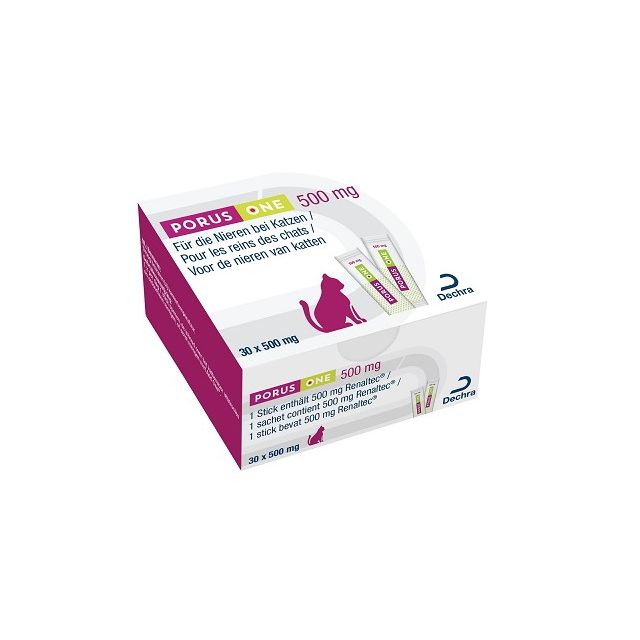Porus One - Sticks
Porus One is a nutritional supplement that supports the kidney function of cats. It binds uremic toxins in the intestines.
Why Porus One?
When proteins are broken down, so-called “uremic toxins” are released. In healthy cats with normal kidney function, these “toxins” are filtered out by the kidneys and then excreted in the urine. In cats with reduced kidney function, such as in cases of chronic kidney disease (renal failure), the elimination of uremic toxins may be impaired, which can lead to a buildup in the body. This can accelerate the deterioration of the kidneys and may lead to issues such as mouth or stomach ulcers, resulting in reduced appetite or nausea.
Porus One was developed to bind the precursors of uremic toxins in the intestines before they reach the kidneys, so that they can be excreted through the feces.
What is Porus One?
Porus One contains Renaltec. Renaltec is a selective, carbon-based absorber in bead form. It consists of small, black, homogeneous beads with a diameter of 0.1 to 0.3 mm. Each bead has a smooth surface with several absorption pores. The spherical shape and the branched internal channel system provide a large absorption capacity. Precursors of uremic toxins can bind to the beads due to an opposite electrical charge. The pores are small enough to only allow very small molecules, such as precursors of uremic toxins, to enter the bead. Larger particles, such as vitamins, enzymes, or cells, cannot penetrate as easily.
Administration of Porus One
Porus One is administered orally. Add the contents of one 500 mg sachet to wet food and feed it to your cat once daily. If your cat only eats kibble, you can mix Porus One with a tasty liquid cat snack like Add One.
Medications and supplements alongside Porus One
If your cat is receiving Porus One for chronic kidney disease, the following medications, supplements, or diet foods may also be beneficial:
Diet food
The cornerstone of managing chronic kidney disease is special diet food, such as Sanimed Renal. This food reduces the burden on the kidneys by containing highly digestible protein (the byproduct of protein breakdown is the aforementioned uremic toxins), a strongly reduced amount of phosphate and salt, an adjusted potassium level, and high levels of anti-inflammatory fatty acids and antioxidants. The food is also highly palatable and has a high energy content.
Medication for chronic kidney disease
Since the kidneys' filtering function is impaired in chronic kidney disease, some cats with CKD lose protein through the urine. Semintra 4mg/ml can help reduce this protein loss through the kidneys.
Cats with chronic kidney disease often have high blood pressure. The use of blood pressure-lowering medication such as Semintra 10mg/ml or Amodip is often necessary.
Supplements and other measures for chronic kidney disease
Because cats with CKD cannot properly concentrate their urine, they need to drink a lot. Always ensure your cat has access to enough fresh water and take action if your cat stops eating or drinking — cats with chronic kidney disease can deteriorate very quickly if they don’t eat or drink enough!
Kidney patients can lose potassium through the kidneys, resulting in a low potassium level in the blood. A recognizable symptom of low potassium is muscle weakness, often seen as the cat holding its head and neck down. Tumil-K, a supplement with added potassium, can help correct this. Other supplements that bind phosphate and uremic toxins include Ipakitine and Pronefra. If phosphate levels remain too high despite a kidney diet, it may be beneficial to add one of these supplements.
If you have a question about Porus One or about kidney failure in cats, please contact us.


